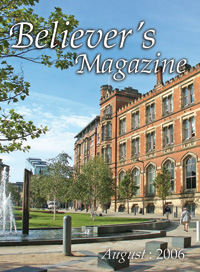Bible reading is essential to spiritual growth. Neglect of the Scripture incurs immaturity in the knowledge of the things of God. Morality, in the widest connotation of the term, suffers, while lack of perception of the divine will is evident in a behaviour which betrays selfish ambition in some of its multifarious forms. The strongest deterrent to evil is a mind well informed by the truth and spirit of the New Testament. Anaemic spiritual health is the precursor of numerous maladies that afflict the communities of the saints. Assembly life is the more virile where the members encourage themselves in the study of the Scriptures: but contrariwise, worldliness and unscriptural practices invade the communal life where little concern exists for a true determination of the mind of God. Ecclesiastical behaviour and individual conduct ought to be fashioned by the discovery of the purpose of God as revealed in His Book. Deviation from the divine pattern can be traced to an ignorance of, or disinclination to obedience to, the instruction patent for any who devote themselves to the study of Holy Writ.
All great movements recorded in church history have been encouraged by the rediscovery of some truth obscured by ecclesiastical tradition. The Bible has gleamed with newly found light to some reader, whose force of witness has affected others into a pathway of recovery for God. That fact in itself is a potent witness to the inspiration of the Bible. Results of a similar nature always follow such a declaration as Peter’s on the day of Pentecost when he affirmed, "This is that which was spoken by the prophet". Both plenary and verbal inspiration are part of the "creed" of this magazine. We believe, in spite of the dissent of modernism, that from Genesis to Revelation "All scripture is given by inspiration of God, and is profitable", and that as originally given every single word has a divine significance. Consequently, no study of the Bible can be complete which does not devote itself to the investigation of the shades of meaning conveyed by the use of different but allied words in the original tongues.
That the Holy Spirit did not create a new language-medium for the conveyance of Christian truth is readily admitted, for the words employed in the New Testament formed the daily vocabulary of millions of the common people in the Graeco-Roman world. Even non- Greek students of the Bible can easily become acquainted, in degrees of more or less accuracy, with the various shades of meaning of a word by consulting a reliable concordance or lexicon. To scholars who write such works, making available to a wide public the fruit of their labours, students acknowledge their indebtedness. If Charles Lamb considered the sacrifice of a new suit worth while for the acquisition of a treasured folio, young Bible students whose means are limited could do worse than follow his example for the purchase of such volumes as Vine’s Expository Dictionary of New Testament Words. Here is a work to revel in and which takes its place amongst the most valuable aids to proper understanding of the Word of God.
Concluded.









